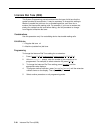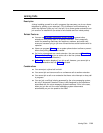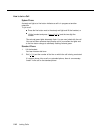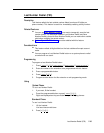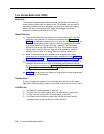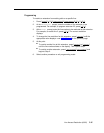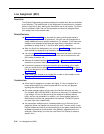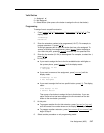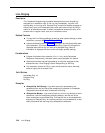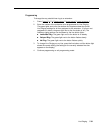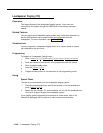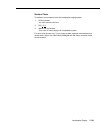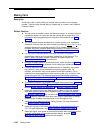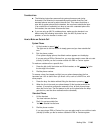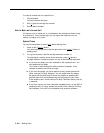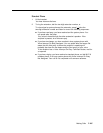
Line Ringing
Description
This Telephone Programming procedure determines how each outside line
assigned to an extension rings. A line can ring immediately, ring with a 20
second delay, or not ring at all. Delayed Ring is useful for backup coverage on
shared lines, such as for secretaries who cover each other's lines. No Ring is
useful for all extensions except 10 when a receptionist answers all calls, or for
phones with no regular users, such as in conference rooms.
Related Features
To copy the Line Ringing settings (as well as other system settings) to other
extensions, you can use Copy Settings (#399).
Users automatically receive Caller ID information for calls that audibly alert
at the extension. (For lines set to Immediate Ring, Caller ID information is
displayed after the first ring; for lines set to Delayed Ring, Caller ID
information is displayed as soon as the call begins audibly alerting.)
Considerations
Program this feature from extension 10 or 11 only, using Centralized
Telephone Programming. Individual users cannot program this feature.
System phone users see the light patterns for the lines assigned to their
extensions even if Line Ringing is set to Delayed Ring or No Ring.
If an extension is set to No Ring, a user at that extension has to manually
select a ringing line to answer a call.
Valid Entries
Immediate Ring ✔
Delayed Ring
No Ring
Examples
Receptionist Call Routing. If you want calls to be answered by the
receptionist first, set the lines at the receptionist’s extension to Immediate
Ring and the lines at the users’ extensions to No Ring.
Receptionist Backup. If you want all calls on a line to ring directly at users’
extensions—with the receptionist providing backup—set the line at the
users’ extensions to Immediate Ring. Then set the line on the receptionist’s
extension to Delayed Ring. An incoming call that is not answered by a user
within 20 seconds will also ring at the receptionist’s extension.
■
■
■
■
■
■
■
5-98
Line Ringing



